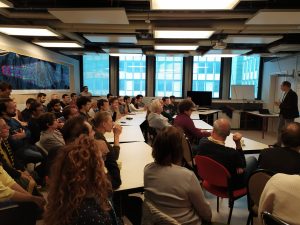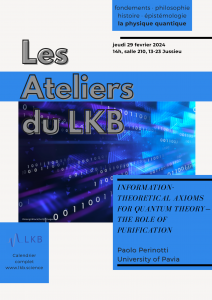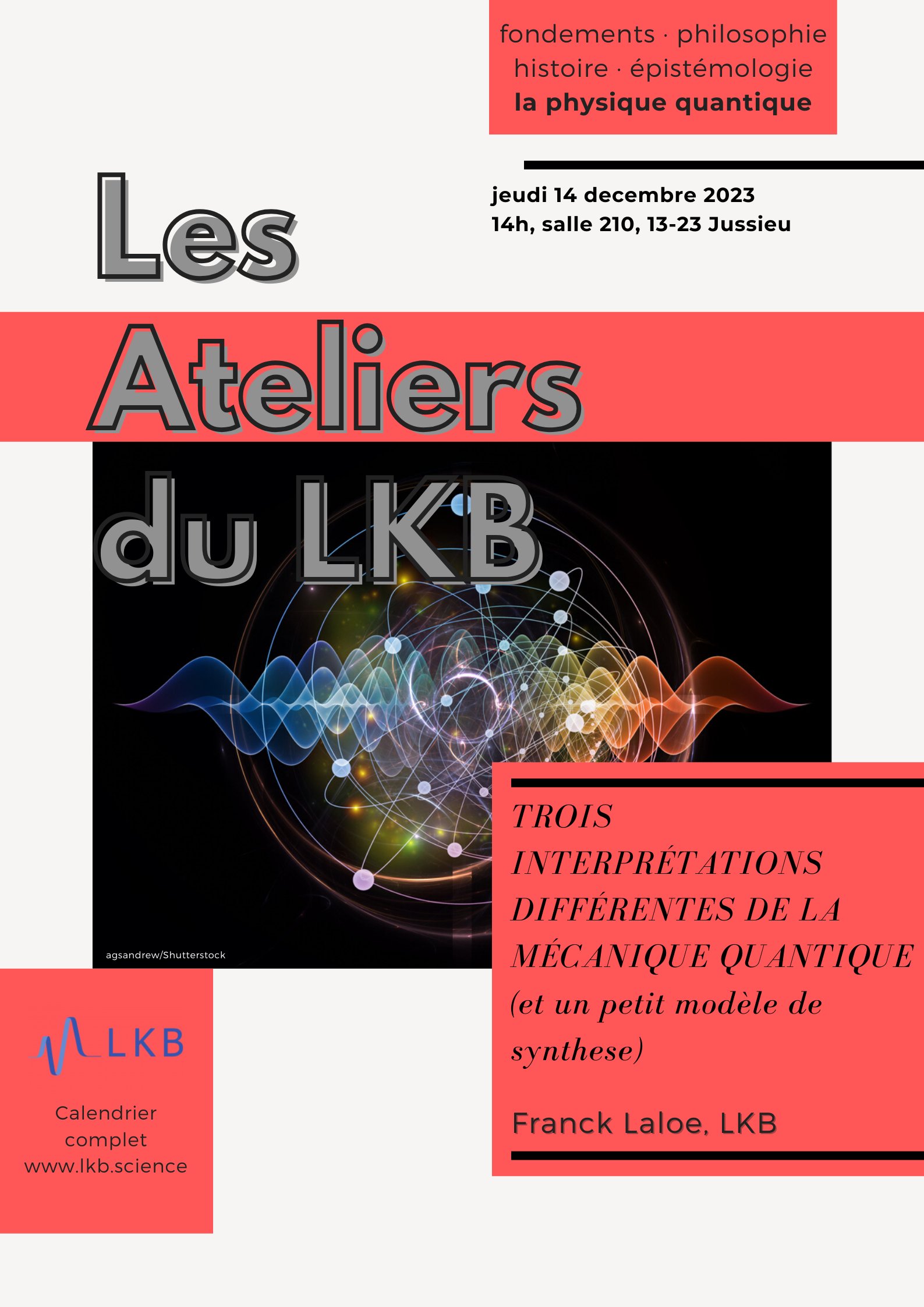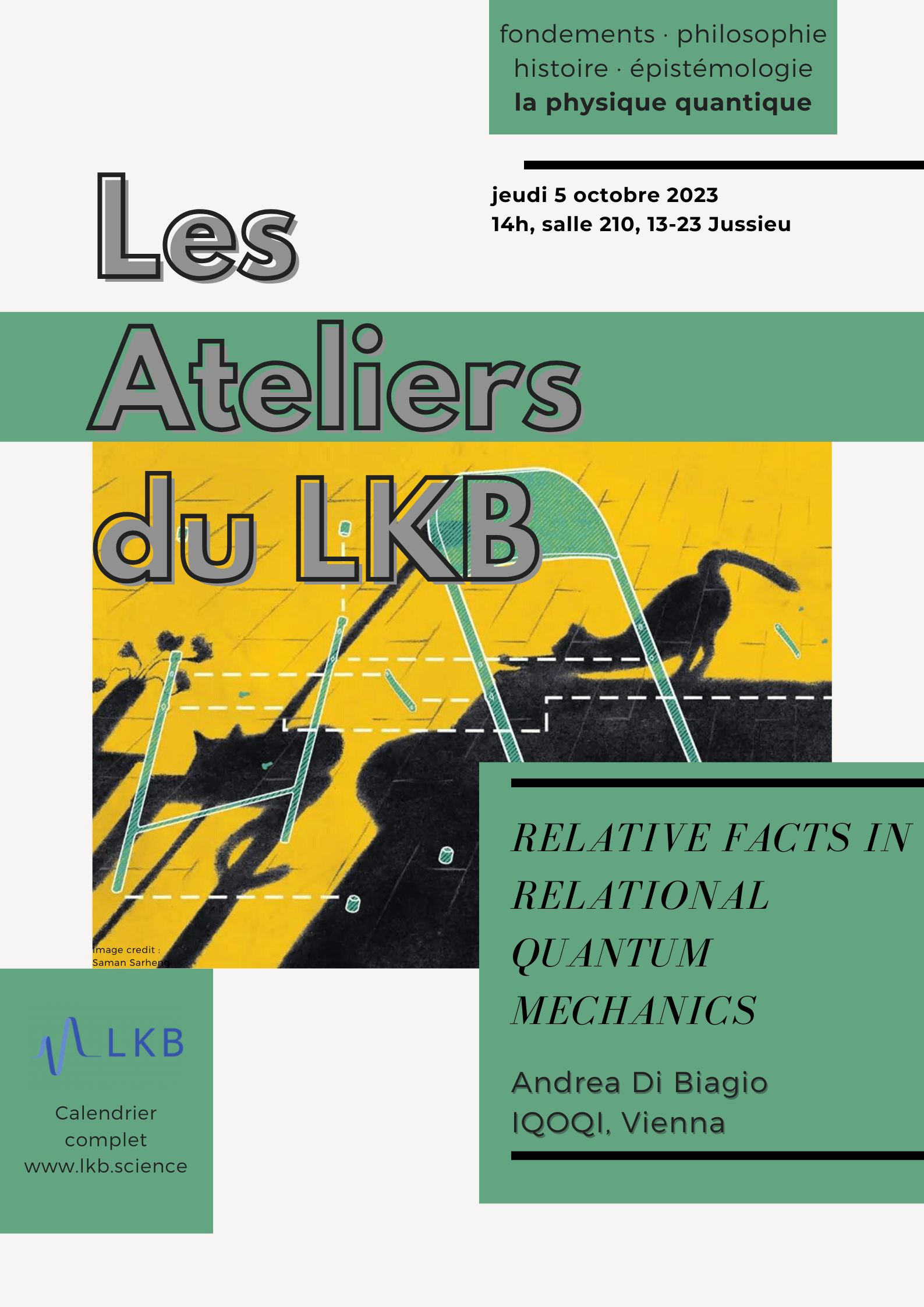LES ATELIERS DU LKB
Initiés en septembre 2019, les Ateliers du LKB se veulent être un espace de rencontre et de débat entre physiciens, philosophes, sociologues et historiens.
Séminaire de réflexion sur la recherche en physique quantique, les Ateliers visent à présenter la diversité des questionnements que peuvent soulever les activités menées au laboratoire.
Trois axes thématiques, en particulier, sont privilégiés : épistémologie, fondements théoriques et étude des pratiques de recherche.
Ateliers à venir
2024/02/29 - 2PM : Paolo PERINOTTI (Uni Pavia)
Information-theoretical axioms for quantum theory—the role of purification
Location: Sorbonne Université – LKB – Room 210 – Tour 13/23 – 2e – Campus Jussieu – Paris 5e
Rendez-vous à 13h45, si vous souhaitez partager un café ou un thé avec nous ! (Meet us at 1.45pm if you’d like to share a cup of coffee or tea with us!)
L’Atelier débute à 14h. (The workshop starts at 2pm.)
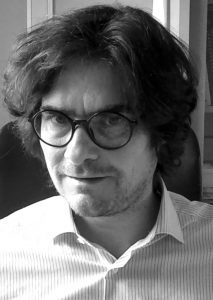 Abstract : In this seminar we will review the efforts towards a reformulation of quantum theory from operational axioms that stemmed from the experience of quantum information theory. Starting with the early two thousands, a handful of new approaches appeared. We will discuss their main traits, and focus on the Pavia approach. This one lead to a formulation in terms of six postulates, and is characterised by two aspects: the first one is the rigorous formulation of a framework of possible theories, among which the quantum one is singled out—the framework of Operational Probabilistic Theories (OPTs); the second one is the central role played by purification, the only pustulate out of six which is not satisfied by the theory of classical systems, and can thus be easily identified as the quintessentially quantum feature of the theory. We will close the seminar with a discussion of recent developments.
Abstract : In this seminar we will review the efforts towards a reformulation of quantum theory from operational axioms that stemmed from the experience of quantum information theory. Starting with the early two thousands, a handful of new approaches appeared. We will discuss their main traits, and focus on the Pavia approach. This one lead to a formulation in terms of six postulates, and is characterised by two aspects: the first one is the rigorous formulation of a framework of possible theories, among which the quantum one is singled out—the framework of Operational Probabilistic Theories (OPTs); the second one is the central role played by purification, the only pustulate out of six which is not satisfied by the theory of classical systems, and can thus be easily identified as the quintessentially quantum feature of the theory. We will close the seminar with a discussion of recent developments.
Ateliers passés
Olivier DARRIGOL (CNRS – SPHERE)25 janvier 2024, 14h
|
Critical history of a few seductive reconstructions of quantum mechanics.Location: Sorbonne Université – LKB – Room 210 – Tour 13/23 – 2e – Campus Jussieu – Paris 5e Abstract : In its most common formulations, quantum mechanics begins with shockingly counterintuitive concepts and highly abstract mathematical objects such as operators in Hilbert space. Since the early years of quantum mechanics, there have been several attempts to reconstruct it from more natural assumptions. The purpose of this talk is to outline three outstanding examples of such reconstructions. The first is based on continuous deformation of the classical algebra of infinitesimal evolutions (Jacques Vey, André Lichnerowicz, and Simone Gutt); the second on the basic logic of Yes-No experimental questions (John von Neumann and Constantin Piron); the third on natural axioms for the probabilities of measurement outcomes (Lucien Hardy), partly justified by correspondence arguments. These reconstructions may help to understand the contents of the theory, they may prepare future generalizations, or they may shed new light on quantum paradoxes and interpretation problems. Regarding this last point, it will for instance be shown that one of the oddest consequences of quantum mechanics, the EPR correlations, can be derived from very simple and natural assumptions on spin measurements. |
Franck LALOE (LKB)14 décembre 2023, 14h
|
Trois interprétations différentes de la mécanique quantique, et un petit modèle de synthèseLocation: Sorbonne Université – LKB – Room 210 – Tour 13/23 – 2e – Campus Jussieu – Paris 5e Résumé : Il est bien connu que le mécanique quantique continue à poser des problèmes d’interprétation; en témoigne le fait que des physiciens respectés peuvent se dire partisans d’interprétations très différentes, et sont même parfois en désaccord sur le contenu exact de l’interprétation standard dite de Copenhague. Une difficulté est de comprendre comment émerge l’unicité macroscopique du monde microscopique: comment, lors d’une mesure unique, un résultat unique de mesure apparaît, alors qu’en général la dynamique linéaire de Schrödinger ou Heisenberg seule ne le prévoit pas.Lors de l’exposé, on ne passera pas en revue l’ensemble innombrable des interprétations qui ont été proposées. On se contentera d’en discuter trois: l’interprétation dBB (de Broglie et Bohm), souvent décriée mais qui peut être le point de départ de considérations intéressantes; les théories quantiques à dynamique de Schrödinger non linaire (GRW et CSL); le point de vue de Penrose qui spécule l’existence d’un mécanisme de projection relié aux fluctuations de l’énergie gravitationnelle. On terminera par la présentation d’un petit modèle de synthèse qui combine les idées de ces trois interprétations, et conduit à une dynamique modifiée de l’état quantique qui s’accorde avec une précision surprenante avec le postulat de projection de von Neumann. Ce modèle reste cependant très naïf dans la mesure où il n’est pas relativiste et ne s’intègre pas facilement dans la théorie des champs. |
Bruno MANSOULIÉ (CEA)16 novembre 2023, 14h |
La naturalité en physique – vraie ou fausse amie ?Location: Sorbonne Université – LKB – Room 210 – Tour 13/23 – 2e – Campus Jussieu – Paris 5e Résumé : les physiciens recherchent de nouvelles théories ou de nouvelles mesures, qui aideraient à résoudre les grandes énigmes actuelles de la physique de l’élémentaire: matière noire, énergie noire, conflit entre théorie quantique et relativité générale. Une question spécifique est le problème de hiérarchie: comment expliquer l’immense rapport entre l’échelle d’énergie électrofaible (100 GeV) et les plus grandes échelles d’énergie concevables, par exemple l’échelle d’énergie d’une possible gravité quantique, la masse de Planck de 10^19 GeV? D’autant que le boson de Higgs a une dangereuse tendance à mélanger les différentes échelles… Dans cette exploration, le concept de « naturalité » est devenu central. Une théorie, des valeurs de paramètres doivent-elles être naturelles? Peut-on définir la naturalité d’une façon quantitative? Bruno Mansoulié est physicien au CEA, au Département de Physique des Particules, qu’il a dirigé pendant 5 ans, et il est membre de la collaboration ATLAS au LHC du CERN. Il a contribué à plusieurs importantes découvertes du domaine, dont le boson de Higgs, au CERN en 2012. Dans son dernier livre , « Physique en Crises, des multivers aux fake news », il étudie les crises actuelles que rencontre la physique fondamentale, et s’intéresse au processus d’élaboration des théories en physique.
|
Andrea DI BIAGIO (IQOQI Vienna)5 octobre 2023, 14h |
Relative facts in relational quantum mechanicsLocation: Sorbonne Université – LKB – Room 210 – Tour 13/23 – 2e – Campus Jussieu – Paris 5e Abstract: « Relative fact » is one of the core concepts of relational quantum mechanics, the basis for its ontology. This is the idea that physical variables do not take objective values, but that they take values only relative to the systems involved in the interactions that can determine the value of that variable. To what extent does the relativity of facts challenge the idea of objectivity? Do we have experimental evidence for the relativity of facts? Can we even make sense of this concept? We will explore these questions by giving an overview of some recent literature on the matter.
|
Carla ALMEIDA (UFABC, Brazil)7 septembre 2023, 14h |
Shaping a concept – a historical view of the public perception of black holesLocation: Sorbonne Université – LKB – Room 210 – Tour 13/23 – 2e – Campus Jussieu – Paris 5e Abstract: A cosmic drain, a galactic vacuum cleaner, a planet eater, a portal to another universe, a black hole in space. One of the best ways to explain an intricate theory to the general audience is through analogies, and they were heavily used to spread the word about the most intriguing astrophysical concept of the second half of the 20th century. But when and why black holes became these black holes? We will explore these questions from a historical perspective, trying to understand how black holes were shaped in people’s minds and the influences they had over future scientific endeavors.
|
Thomas RYCKMAN (Stanford University)27 mars 2023, 14h |
Niels Bohr: Transcendental Physicist
Abstract: Bohr’s understanding of quantum theory, not to be confused with the ‘Copenhagen Interpretation’, stemmed from his attempt to address “the problem of how objectivity may be retained during the growth of experience beyond the events of daily life.”A defining trait of transcendental philosophy regards objectivity as not given (a perspective-free picture of reality) but a problem requiring solution. Neither a philosopher nor adherent of any philosophical school, Bohr’s transcendental solution to the problem of objective description in quantum theory locates it within « conditions of the possibility of unambiguous communication » of experimental setups and results of measurement. In this regard, Bohr is a precursor of contemporary interpretations of the quantum state, according to which the meaning of the quantum state consists in information to better inform expectations of those employing it. |
Marco Túlio QUINTINO (Lip6, Sorbonne Université)27 mars 2023, 14h |
Parallel, sequential, and non-causal strategies for transforming unitary operations and discriminating quantum channel via a higher-order approach
Abstract: Higher-order quantum operations is a paradigm where operations, such as quantum channels and unitary gates, play the role of a quantum states and are viewed as objects which may be subjected to transformations. In this talk, we show how the framework of higher-order quantum operations provide powerful mathematical methods to tackle several problems in quantum information. We will conduct our talk following two motivating and recurring examples, the problem of designing quantum circuits for inverting an arbitrary unitary operation and how to computationally tackle different strategies for discriminating quantum operations. In the end of the talk, we will also discuss the constraints imposed by causality and how strategies without a definite causal order may be used as a resource in quantum information processing. This talk will cover results from various papers, such as: |
Karim THÉBAULT (University of Bristol)20 janvier 2023, 14h |
Modelling Open Systems in Quantum Physics and CosmologyJames Ladyman & Karim Thebault (University of Bristol)
Abstract: None of the systems that we find in nature are in reality ‘closed systems’. Rather, they are all sub-systems of the universe. When we talk of ‘closed systems’ in physics we are describing systems that can be effectively modelled as closed since their exogenous interactions with the rest of the universe are not important for the relevant purposes, on the relevant scale. The characteristic feature of such models is conservation of a relevant quantity on the relevant time scale. For example, conservation of heat in closed thermodynamics systems, conservation of matter in closed chemical systems, and conservation of coherence in closed quantum systems. Conversely, when we talk about ‘open systems’ in physics, we are not making the trivial claim that a system is coupled to the environment. Since gravitational interactions are unscreenable, technically all systems are so coupled. When we talk of ‘open systems’ in physics we are describing systems that can be effectively modelled as open since their exogenous interactions with the rest of the universe are important for the relevant purposes, on the relevant scale. The characteristic feature of such models is failure of conservation of a relevant quantity on the relevant time scale. Under this way of thinking about open systems, we do not preclude the possibility of modelling a system as open such that the failure of conservation of the relevant quantity is combined with autonomous dynamics in which there are well-posed equations of motion for the system degrees of freedom alone. How should we interpret such autonomous open system models? Should they always be taken to implicitly represent the system in question as part of a larger, closed system? And what would it mean for us to model the universe as an autonomous open system? In this talk we will offer a framework for thinking about these questions drawing upon recent work on open quantum systems due to to Cuffaro and Hartmann (2021) and on autonomous non-conservative cosmology due to Sloan (2021).
Cuffaro, Michael E., and Stephan Hartmann. « The open systems view.” 2021, https://arxiv.org/abs/2112.11095 Sloan, David. « New action for cosmology. » Physical Review D 103.4 (2021): 043524. https://arxiv.org/abs/2010.07329 |
Patrice CAMATI (Institut Néel – Grenoble)17 novembre 2022, 14h |
Can we extend the notions of work and heat to the quantum realm?
Abstract: The emergent field of Quantum Thermodynamics extends thermodynamic concepts to small quantum systems. A number of important results have been obtained in the past decades, e.g., quantum fluctuation relations and thermodynamic uncertainty relations, among others. Many of the results consider a system coupled to a heat reservoir and/or driven by a time-dependent Hamiltonian to define the widely accepted notions of work and heat. Apart from such settings, there is currently no consensus on how work and heat should be defined. How can heat be defined without resorting to the coupling with a heat reservoir? For strongly coupled quantum systems, how should we handle the non-negligible coupling energy? Can notions of work and heat be defined for two interacting qubits? A number of proposals have been made and this endeavor is still an open problem, comprising an active research area in the field. I will review the accepted notion of work and heat and discuss a few proposals put forth recently. In particular, I will present and discuss some consequences of a general energetic framework we have been developing. In this talk, we will discuss the conceptual hurdles of extending thermodynamic concepts to non-thermodynamic settings.
|
Alastair ABBOTT (Inria)13 octobre 2022, 14h |
Causal indefiniteness from quantum control of processes
Abstract: Causality is often treated as a classical notion but there have been growing calls for a fundamentally quantum notion of causal structure, motivated e.g. by the quest to develop a theory of quantum gravity or to explain various nonclassical features of quantum mechanics. This has led to the development of an abstract framework in which causally indefinite processes can be formulated, for example by superposing quantum processes with different causal orders. However, interpreting many of these processes is difficult. In this talk I will give an overview of indefinite causal order in quantum mechanics and some of the recent efforts to understand it within quantum information theory. I will focus, in particular, on the question of which causally indefinite processes can be given physical interpretations. On one hand, information theoretic principles may allow certain types of causal indefiniteness to be ruled out as non-physical; while on the other hand, certain processes can be interpreted concretely as generalisations of quantum circuits with quantum control. This interpretation moreover raises questions about the physical limits of computation and whether causal indefiniteness can be exploited |
Damian MARKHAM9 juin 2022, 14h |
Fragility and strength of non-classicality for quantum networksLocation : Campus Pierre & Marie Curie – Place Jussieu – Tour 13/23 salle 210 – 75005 ParisThere are probably as many notions of non-classicality as there are people who will attend this talk (or read this post). In quantum information, we are in the privileged position (or not, according to taste) of having, in recent years, developed some pretty formal mathematical frameworks for what we mean by non-classicality.
In this talk I will present some of these, how they are used to prove quantum behaviour, how this can translate to quantum advantage for certain information processing tasks in networks, and their fragility and what we can try to do about it.
|
Giulia RUBINO31 mars 2022, 14h |
Quantum superposition of thermodynamic evolutions with opposing time’s arrows?Location : Campus Pierre & Marie Curie – Place Jussieu – Tour 13/23 salle 210 – 75005 ParisMicroscopic physical laws are time-symmetric, hence, a priori there exists no preferential temporal direction. However, the second law of thermodynamics allows one to associate the « forward » temporal direction to a positive variation of the total entropy produced in a thermodynamic process, and a negative variation with its « time-reversal » counterpart. This definition of a temporal axis is normally considered to apply in both classical and quantum contexts. Yet, quantum physics admits also superpositions between forward and time-reversal processes, whereby the thermodynamic arrow of time becomes quantum-mechanically undefined. In this work, we demonstrate that a definite thermodynamic time’s arrow can be restored by a quantum measurement of entropy production, which effectively projects such superpositions onto the forward (time-reversal) time-direction when large positive (negative) values are measured. Remarkably, for small values (of the order of plus or minus one), the amplitudes of forward and time-reversal processes can interfere, giving rise to entropy-production distributions featuring a more or less reversible process than either of the two components individually, or any classical mixture thereof. |
Hervé ZWIRN10 mars 2022, 14h |
Why decoherence does not solve the measurement problem?Location :Campus Pierre & Marie Curie – Place Jussieu – Tower 44-54 – Room 105 – 75005 Paris and on ZoomThe measurement problem is often considered an inconsistency inside the quantum formalism. Even though it is now generally agreed that it is not the case, decoherence has sometimes been viewed as a possible solution. I will show that it is indeed not the case and will present what decoherence actually brings and which the problems we are left with are. I will then propose a possible solution to the measurement problem taking the role of the observer into account. -667. https://arxiv.org/abs/1505.05029 http://arxiv.org/abs/1607.02364 https://arxiv.org/abs/1812.06451 – 2020 « L’observateur, un défi pour la physique quantique« ; Pour la Science N°509, Mars 2020. – 2021 “Is the Past Determined?”, Found. Phys. Vol. 51, 57, https://rdcu.be/cj3a7, https://arxiv.org/abs/2009.02588 |
Lev VAIDMAN10 février 2022, 14h |
Weak value : a property of a single pre and post-sele
|
Flavio DEL SANTO13 janvier 2022, 14h |
Philosophysics: A case study of a successful interplay between physics and philosophy for the establishment of quantum foundations in ViennaLocation : Jussieu Tour 13/23 salle 210, inscription obligatoire sous couvert d’avoir le pass sanitaire à jour ou via ZoomSi vous souhaitez vous lancer dans la discussion, consultez le papier de Flavio iciThe field of Foundations of Quantum Mechanics (FQM) suffered varying fortunes in its history. This field of research is quite unconventional within physics, for it often addresses questions that lie at the border of philosophical investigation. In this talk I will elucidate a case study which aims to show that in Vienna –where in recent years FQM has become one of the main research fields within physics– it was a particularly strong connection between physics and philosophy that paved the way for the establishment of the prolific field of FQM there. This could lead to draw general conclusions about the value of a structured interaction between philosophers and physicists concerned with the foundational aspects of this discipline. |
Vincent Bontems and Christian de Ronde21 octobre 2021 |
You can’t always get what you want. (A simondonian interpretation of quantum entanglement)En présentiel : Amphithéâtre Charpak sur le campus Pierre-et-Marie Curie à Jussieu, le 21 octobre 2021 à 17H30 et en distancielThe understanding of QM is obscured by a twofold “epistemological obstacle” (Bachelard 1938) that has taken quite different and apparently opposed forms in the interpretation of the theory: substantialism and instrumentalism. While substantialism is the ontological assumption that reality is entirely composed of individuals with permanent unity and identity (Bontems & de Ronde 2011), instrumentalism is the anti-realist assumption that science is just a procedure to make predictions about measurement outcomes (‘clicks’ in detectors). Instead of searching for new concepts that would explain what QM is really talking about, the Bohrian ‘solution’ that prevailed was, on the contrary, to subvert realism by retaining classical substantialist concepts as fictions embedded in paradoxical story-tellings illustrating experimental procedures with essential gaps bridged by irrepresentable notions such as ‘quantum particles’ and ‘quantum jumps’.
One of the kernel notions of QM is entanglement, originally designed by Einstein as a « spooky action at a distance » to demonstrate the inconsistency of ‘quantum jumps’ in a substantialist framework. Even though entanglement, considered as a spooky philosophical notion, was completely erased from physics for half a century, during the 1990s it was included –due to its pragmatic possibilities– once again within the still orthodox contemporary Borhian narrative. After recalling the conceptual bases of a Simondonian interpretation of QM (Bontems & de Ronde 2019) – the hypothesis of preindividuality and the postulate of a realism of relations – we discuss the inconsistencies present in the orthodox definition of entanglement.
Our claim is that the Bohrian narrative is biased by the fact that it presupposes the existence of individuated particules, while Simondon’s realism of relations shifts the focus on preindividuality and the processes of individuation that may (or may not) generate such individuals. This allows us to sketch a realist but non-substantialist understanding of entanglement that leaves behind both the mere instrumentalist reference to measurement outcomes and substantialism: “You can’t always get what you want… but why did you want particles in the first place?”
|
Giacomo Mauro D’Ariano10/06/2021 |
No purification ontology, no quantum paradoxesIt is almost universally believed that in quantum theory the two following statements hold: 1) all transformations are achieved by a unitary interaction followed by a von Neumann measurement; 2) all mixed states are marginals of pure entangled states. I name this doctrine the dogma of purification ontology. The source of the dogma is the original von Neumann axiomatisation of the theory, which largely relies on the Schroedinger equation as a postulate, which holds in a nonrelativistic context, and whose operator version holds only in free quantum field theory, but no longer in the interacting theory. In the present paper I prove that both ontologies of unitarity and state purity are unfalsifiable, even in principle, and therefore axiomatically spurious. I propose instead a minimal four-postulate axiomatisation: 1) associate a Hilbert space HA to each system A; 2) compose two systems by the tensor product rule HAB = HAxHB; 3) associate a transformation from system A to B to a quantum operation, i.e. to a completely positive trace-non-increasing map between the trace-class operators of A and B; 4) (Born rule) evaluate all joint probabilities through that of a special type of quantum operation: the state preparation. I then conclude that quantum paradoxes-such as the Schroedinger-cat’s, and, most relevantly, the information paradox-are originated only by the dogma of purification ontology, and they are no longer paradoxes of the theory in the minimal formulation. For the same reason, most interpretations of the theory (e.g. many-world, relational, Darwinism, transactional, von Neumann-Wigner, time-symmetric, …) interpret the same dogma, not the strict theory stripped of the spurious postulates. |
Fabien Grégis08/04/2021 |
Approches fréquentistes et bayésiennes dans l’analyse des incertitudes de mesure : principes conceptuels et enjeux épistémologiques«Plusieurs siècles après les débuts de la théorie mathématique des erreurs, il n’y a pas encore aujourd’hui de consensus parfaitement clair quant au calcul et à l’interprétation des incertitudes de mesure. Ma présentation visera à exposer les fondements conceptuels et épistémologiques d’un débat récent sur les fondements statistiques de l’analyse d’incertitude en métrologie. Confrontés à un problème concret, touchant au traitement probabiliste des erreurs systématiques, métrologues et statisticiens ont saisi l’opportunité d’un regain général d’intérêt envers les statistiques bayésiennes pour proposer une nouvelle conception de l’incertitude de mesure qui remet en question la tradition fréquentiste, jusque là dominante durant le 20e siècle. Je chercherai à expliquer d’une part les raisons pour lesquelles les métrologues en sont venus à proposer une alternative bayésienne, et à décrire d’autre part l’entremêlement des enjeux à la fois pratiques et épistémologiques de ce tournant, qui engage en particulier une réflexion sur la subjectivité de l’activité de mesure et amène à reconsidérer l’interprétation du concept d’incertitude de mesure dans les sciences expérimentales.» |
Caslav BRUKNER18/03/2021 |
On the persistent reality of the observer’s perception« The discussion about the quantum mechanical thought experiment « Wigner’s friend » has recently gained renewed intensity. The original thought experiment involved the « observation of an observer », in which the friend not only observes a physical system, but is simultaneously the object of another observation by Wigner. Recent theoretical results and experimental tests of extended Wigner-friend scenarios suggest that treating observational knowledge of other agents as if it were one’s own can be problematic in quantum mechanics. In short, « facts are only relative to observers ». In my talk, I will review these findings before arguing that a single agent’s knowledge over time can have even more counterintuitive consequences: when making predictions about one’s observations at two different points in time, it may be untenable in quantum mechanics to treat a single agent’s knowledge acquired in the past as if it were still present.» |
Antoine Tilloy(MPQ)18/06/2020 |
Les modifications non-linéaires de la mécanique quantique
Les postulats de la mécanique quantique sont étranges : ils disent à la fois ce qu’est la dynamique du monde, avec l’équation de Schrödinger, et ce que l’on peut en observer, avec le postulat de la mesure. A priori, dans une théorie plus standard, le second postulat devrait être une conséquence mathématique du premier, et non une hypothèse indépendante. Si la décohérence permet de comprendre pourquoi les deux postulats n’entrent pas en conflit en pratique, elle ne permet pas de réduire le second au premier : c’est le problème de la mesure. Vers la fin des années 1980, des théoriciens ont cherché à réduire cette bizarrerie à l’aide de petites modifications non-linéaires et stochastiques de l’équation de Schrödinger. Au prix d’infinitésimales déviations au prédictions usuelles, ces dernières permettent de réduire le postulat de la mesure à la dynamique de la fonction d’onde. Dans cette approche, l’effondrement de la fonction d’onde est objectif, et prédit par la dynamique. Mon objectif sera de présenter l’idée générale de ces modifications, d’expliquer leurs contraintes théoriques et leurs conséquences expérimentales. J’essaierai de mettre en avant un point contre-intuitif et je crois peu connu : le contenu empirique de ces modifications reste reproductible par une dynamique purement linéaire, et en ce sens elles ne changent pas tant les prédictions de la théorie quantique au sens large que celle de son instanciation actuelle où le Hamiltonien est celui du Modèle Standard. |
Pierre Verschueren(UFC)14/05/2020 |
Jeunes-Turcs et Mandarins : le doctorat ès sciences physiques et les transformations du métier de physicien (1945-1968)
Le visage des sciences physiques change profondément après 1944 : elles sont les premières disciplines confrontées à la massification exponentielle du système d’enseignement supérieur et de recherche, ce qui se traduit par une recomposition des rapports entre leurs acteurs et leurs institutions, ainsi que par une transformation de ce qui fait leur métier. En prenant comme point d’observation les doctorats ès sciences physiques soutenus devant la faculté des sciences de Paris, en particulier la composition des jurys et le contenu des rapports, il s’agit d’étudier la transformation des normes qui structurent et conditionnent l’entrée dans les carrières de l’enseignement supérieur et de la recherche ; l’hypothèse discutée est que s’opère alors un basculement, la sortie d’un monde professionnel tourné vers l’idéal du savant et l’entrée dans un autre monde, organisé autour de l’idéal du chercheur. |
Vincent Ardourel(CNRS – IHPST)16/04/2020 |
Les idéalisations infinies en mécanique statistique
Nous nous intéresserons ici au problème des idéalisations infinies en mécanique statistique, un problème discuté en philosophie des sciences depuis quelques années. Ce problème apparaît avec le recours indispensable à certaines hypothèses que l’on sait pourtant fausses dans le but d’expliquer certains phénomènes physiques. Les débats se concentrent principalement autour de la limite thermodynamique. Il est en effet généralement admis que celle-ci est nécessaire pour expliquer les phénomènes de transitions de phase en physique statistique. J’expliciterai en quoi cela est un problème pour la réduction de la thermodynamique à la physique statistique et quelles sont les tentatives proposées pour résoudre ce problème. |
Michel Bitbol(ENS – Archives Husserl)20/02/2020 |
La physique quantique à la première personne du singulier du temps présent
Le QBism (Quantum Bayesianism) repose sur une interprétation subjectiviste des probabilités. Mais, au-delà de cette simple option interprétative, le QBism opère un changement sans précédent du sens et du statut de la théorie physique. Dans le QBism, les symboles de la théorie, comme par exemple l’état quantique, ne font plus du tout référence à d’hypothétiques microsystèmes. Ils dénotent un instrument de calcul des probabilités de résultats expérimentaux, valant pour chaque agent particulier. Ici, l’agent est à la fois l’origine (i) de l’évaluation probabiliste et (ii) de l’intervention qui suscite les résultats dont il estime les probabilités. |
Vincent Bontems(CEA – LARSIM)24/10/2019 |
De quoi l’innovation est-elle le nom ?
Le mot « innovation » a envahi les discours au point de devenir l’horizon contemporain des activités de recherche. Il désigne désormais l’objectif prioritaire, sinon exclusif, du travail des chercheurs. Mais à quoi correspond-il ? En revenant à ses origines politiques lointaines, puis aux disciplines (sociologie et économie) qui en ont élaboré un usage réglé, et enfin à l’évolution des différents modèles de la « chaîne de l’innovation », on esquissera une généalogie du terme. Celle-ci ne révélera pas nécessairement la vérité du concept mais éclairera les enjeux actuels. |
Alexei Grinbaum(CEA – LARSIM)25/09/2019 |
Quantum Foundations in the XXI Century
What’s new since Bell inequalities? Are we still debating the interpretations of quantum mechanics? Can one teach physics today without using Popescu-Rohrlich boxes? I’ll describe several new research directions, including postquantum correlations, quantum contextuality, and indefinite causal orders. |

